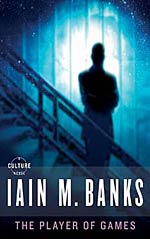
![]() everythinginstatic
everythinginstatic
3/6/2014
![]()
Last year, I decided that it was time to read the Culture novels. They are hailed not only as nuanced sci-fi, but also an incredibly imaginative world. I read Consider Phlebas last year, which is apparently one of the weaker novels in the series (it's the first, and one that's not often recommended as a starting point). As a rule, I do try to keep the order of novels, despite there being very few links between them (the only exception to this was Discworld, which I started reading through Witches Abroad long before I knew it was part of a series). Now, Consider Phlebas was not a terrible novel. It didn't have incredibly well-rounded characters, and at times it fell into the trop of explaining all the things, but I didn't feel that it made too much of a mess of introducing the Culture (despite the fact that the action is actually told from outside of it, from the Idiran point of view).
The Player of Games, on the other hand, is told from the perspective of someone within the Culture. Jernau Morat Gurgeh is a player of games, and a skilled one at that. Well known for his prowess at any game, he spends most of his time looking for more challenges, and reading/writing academic papers on games and their playing methods. It's the perfect example of how the Culture operates: its citizens have all their needs catered for, hunger, poverty and disease have been eradicated, and they can dedicate themselves to whatever pursuits they wish (if this doesn't sound like utopia, I don't know what does). Gurgeh is approached by the Culture's Contact division, Special Circumstances branch, and recruited to travel to the Empire of Azad, to engage in the game of Azad. It's a game so lifelike, so complex, that the winner is crowned Emperor. It is a vicious, cruel and warmongering society, and Gurgeh finds himself embroiled in politics, the target of blackmail and assassins, as he struggles to understand exactly why Contact chose him as their Player of Azad.
Perhaps the most fascinating part of this is the game itself. It's like a hyperrealistic chess game, and although Banks doesn't go into a lot of detail about it, it wasn't that hard to actually picture it. I became incredibly invested in the story, and the mood actually spans the gamut of emotion, with the humour being provided mainly by the drone Flere Imsaho (and other AIs). By the time the plot has reached its climax, I was incredibly invested, and almost wished my commute could be a little bit longer (which trust me, doesn't happen). What I also love is that Banks' aliens really feel alien. They are humanoid, yes, but they also have three genders, and in the Culture, they are able to change physical sex at will (and even avoid permanent death). The twist at the end isn't that surprising (I had guessed it about halfway through), but it didn't affect my enjoyment of the novel at all. I really can't express just how impressed I was. The writing is tight and solid, the characters are human (even if unlikeable at times) and the plot move swiftly along. It is a novel that really sells the Culture, especially when compared to the Azadians.
If anything, this book has really renewed my desire to read the rest of the Culture novels (hopefully in time for Loncon3 this summer!). I still don't regret my decision to start off with Consider Phlebas (as it does add a bit of background to this novel), and I hope to travel the breadth and length of the Culture in future books.